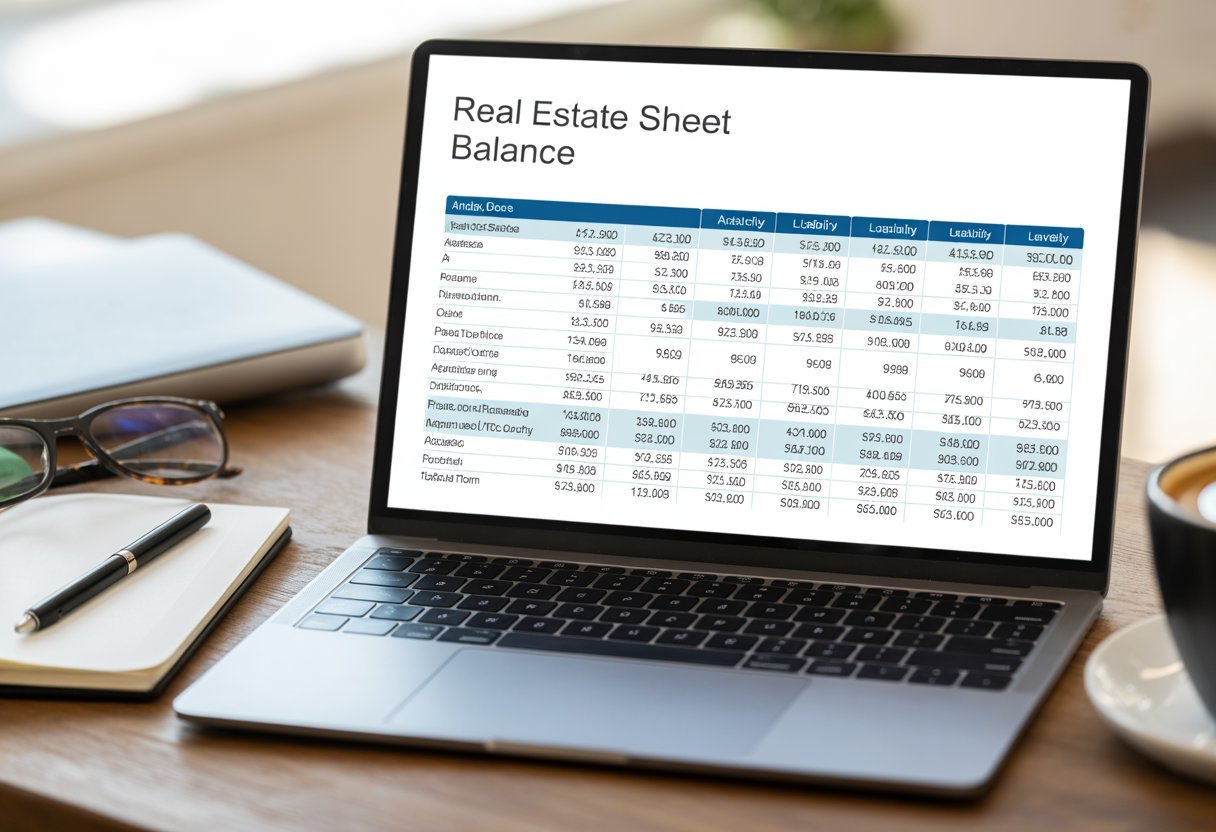Navigating the financial side of real estate can be challenging for both new and seasoned professionals. Mistakes in your accounting process not only impact your bottom line but also increase your risk of compliance issues and missed deductions. Knowing what pitfalls to avoid can help you protect your returns and keep your operations running smoothly.
Common errors—such as misclassifying expenses, neglecting real-time tracking, and combining personal with business accounts—can quickly escalate into bigger problems. Staying aware of these frequent mistakes gives you the tools to strengthen your financial records and make smarter business decisions.
Key Takeaways
- Recognize frequent real estate accounting mistakes.
- Understand the risks of poor compliance.
- Learn practical ways to avoid common errors.
Common Real Estate Accounting Mistakes
Errors in real estate accounting can lead to reduced profitability, unnecessary legal risks, and lost financial opportunities for your rental property or property management business. Focusing on clear practices can protect both your profit and compliance with business law.
Inaccurate Bookkeeping
Accurate bookkeeping forms the foundation of sound real estate accounting. When transactions are recorded inconsistently or omitted entirely, you lose visibility into your finances and jeopardize critical business decisions.
Common signs of bookkeeping errors include mismatched records, missing invoices, and irregular reporting periods. These mistakes often result from poor record-keeping habits, lack of accounting knowledge, or using outdated tools. As a real estate professional, keeping detailed, timely, and structured transaction records is vital for tracking your property’s performance and ensuring transparent tax reporting.
Investing in reliable accounting software or working with an experienced bookkeeper can minimize errors. Errors in this area may also complicate business law compliance and impact how profitability is measured and reported. For a comprehensive list of these pitfalls, visit this guide on real estate accounting mistakes.
Improper Tracking of Income and Expenses
Failing to properly track rental property income and expenses leads to distorted financial statements and makes it difficult to evaluate the real profit of your portfolio. If you do not log all tenant payments, fees, repairs, and interest, your records will not accurately show true profitability.
Many landlords neglect to track expenses in real time, relying instead on memory or sporadic updates. This usually causes missed deductions and misreported numbers during tax season. To avoid mistakes, you should categorize every source of income (rent, late fees) and every expense (maintenance, legal fees, improvements) as they occur.
Modern accounting platforms often allow you to digitize receipts and automate entries, making the process efficient and accurate. Proper tracking is essential for compliance, audit readiness, and improved insight into your operations. Read more on common accounting mistakes landlords make.
Commingling Personal and Business Funds
Mixing personal and business transactions is a frequent error in real estate accounting. This practice clouds financial visibility, complicates tax filings, and can violate business law by undermining the legal separation between you and your property management entity.
Consider these common risks of commingling funds:
- Inaccurate profit calculation for your real property
- Difficulty in justifying expenses if audited
- Reduced legal protections for your business
Always open a separate bank account dedicated to your real estate activities. Use it exclusively for rental property income, mortgage payments, repairs, and other property management costs. This not only improves your record-keeping but also supports a more professional approach to accounting. For further insight, examine this guide to avoiding real estate accounting mistakes.
Neglecting to Reconcile Accounts Regularly
Regular reconciliation of your accounts is a critical defense against undetected errors or fraud. If bank, credit card, and accounting records are not compared frequently, discrepancies can grow over time, leading to costly corrections and potential compliance issues.
Account reconciliation helps you verify:
- All rental income was deposited accurately
- Property-related expenses match receipts and invoices
- No unauthorized transactions affected your funds
You should reconcile accounts at least monthly. This habit ensures your real estate accounting reports reflect accurate figures, making it easier to analyze performance and prepare for audits. Missing this step is one of the most common accounting mistakes among landlords and investors and can ultimately impact both your profitability and peace of mind.
Legal and Compliance Risks in Real Estate Accounting

Mistakes in real estate accounting often carry serious legal and financial consequences. Whether you’re a landlord or an investor, missing important details can affect profitability or even trigger regulatory actions.
Violating Real Estate Law and Regulations
Failing to follow real estate law when handling accounting tasks can result in significant fines, lawsuits, and even revoked licenses. Issues like mishandling trust accounts, incorrectly allocating tenant security deposits, or violating fair housing regulations are common pitfalls. Employment law comes into play if you misclassify employees versus independent contractors in your records.
Associa and similar property management associations often have their own compliance requirements. Ignoring these can also invite legal scrutiny. Inaccurate segregation of personal and business expenses, especially in mixed-use properties, may raise flags with consumer protection agencies.
Regular legal reviews of your accounting practices are essential. It’s important to document compliance steps and consult with professionals who understand both real estate law and estate law.
Inadequate Documentation for Audits
A lack of proper documentation can turn a routine financial review into a stressful audit with personal or legal risks. Auditors look for invoices, contracts, and clear ledgers that support income and expense entries. Missing documents or incomplete records may raise questions of fraud, leading to deeper investigations or even personal injury law claims if tenant disputes arise.
Keep all supporting paperwork organized and accessible. List out documents such as:
- Lease agreements
- Maintenance records
- Proof of insurance
- Invoices for repairs
- Tax returns
Maintaining thorough documentation is also crucial when dealing with legal disputes, such as those arising from family law matters related to property division. By following a consistent, well-documented accounting process, you minimize risks of compliance failures.
Tax Mistakes Impacting Profitability
Tax mistakes can significantly reduce your profits. Common errors include failing to track depreciation, not claiming all eligible deductions, or misclassifying capital improvements as regular expenses. Persistent tax errors can trigger IRS audits and potential penalties or legal troubles, as documented by accounting experts in common real estate accounting mistakes.
Incorrect reporting can also hurt your business if it leads to overpaying taxes or missing deadlines for filings. Each error eats into your bottom line. It’s vital to follow all applicable local and federal tax laws and consult with professionals who understand both real estate and accounting to ensure compliance and profitability.
Frequently Asked Questions
Real estate accounting requires careful attention to how transactions are recorded, expenses are categorized, and tax rules are applied. Mistakes can lead to inaccurate financial records, higher tax bills, and missed opportunities to maximize deductions.
What are common errors in recording real estate transactions?
Many investors and landlords miss recording certain expenses or income, leading to incomplete records. Data entry mistakes and failing to reconcile accounts each month are also frequent problems. Errors like double entries or omitting deposits often result in misreported income or expenses.
How can misinterpreting repair and maintenance expenses impact financial statements?
Confusing repairs with capital improvements can distort your expense reporting. Repairs should be expensed in the current period, but capital improvements must be depreciated over time. If you wrongly classify these, your profit and loss statement won’t reflect the true operating costs, which can affect both decision-making and tax filings.
What is the impact of incorrect classification of properties on tax liabilities?
Mistaking personal property for investment property, or vice versa, can alter how income and expenses are taxed. Improper classification might cause you to miss deductions you’re entitled to or incorrectly report income. This often results in larger tax bills or potential issues with an audit.
How does failing to properly allocate costs affect financial reporting?
If you don’t accurately allocate costs between properties or between different accounts, your financial statements won’t show each property’s true performance. This can mislead you when evaluating which properties are profitable. It also complicates preparing year-end tax documents and meeting compliance requirements.
What are the risks of not adhering to GAAP in property accounting?
Not following Generally Accepted Accounting Principles (GAAP) can cause inconsistencies in your records. This makes it hard to compare your financials over time or with industry benchmarks. Non-compliance also raises the risk of legal issues or scrutiny from tax authorities.
Why is the accurate calculation of depreciation essential in real estate bookkeeping?
Depreciation is a required deduction for real estate owners but can be difficult to calculate correctly. Errors can cause you to overstate or understate expenses on your tax return. If you depreciate assets using the wrong method or timeline, you might pay more tax than necessary or invite an IRS correction.



